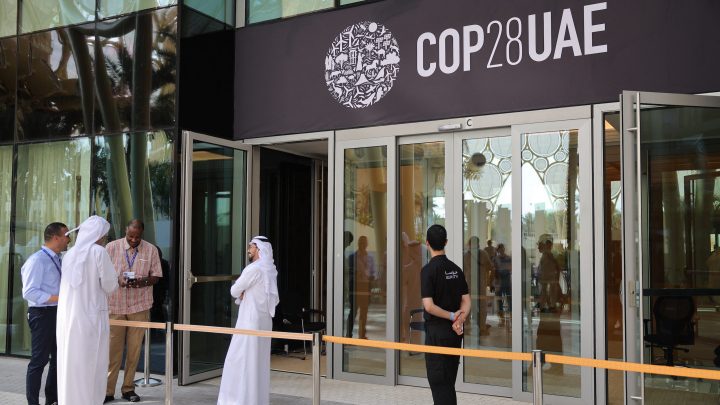
The UN is holding this year’s climate conference in a petrostate reachable only by air
The UN is holding this year’s climate conference in a petrostate reachable only by air

Negotiators from nearly 200 countries will gather in Dubai on Thursday for COP28, the United Nations climate change conference.
Global negotiations like it are crucial if we’re going to limit greenhouse gas emissions. But holding this conference each year requires thousands of people to fly to one location, creating more emissions. This year, that location is a country whose economy depends on exporting climate-warming fossil fuels: the United Arab Emirates.
That’s heightened the perennial debate weighing the emissions created by COP against the hope that the proceedings will bring down fossil fuel reliance in the long run.
If you’re one of the more than 70,000 people planning to go to COP28 in Dubai and you want to reduce your personal carbon emissions by not flying there, you have a problem.
“Dubai is surrounded by conflict zones, which blocks these land routes from Europe, Asia and Africa,” said Carole Roberts, who researched the issue at University College London. That means essentially everyone has to fly, which means more carbon emissions.
“In our analysis, we showed that commercial air travel was four times more polluting than train transport” and it’s six times worse than bus travel, Roberts said.
So, if you’re traveling from the United Kingdom, as some of Roberts’ fellow researchers are, your least bad option is to take a train or bus to Istanbul, then fly the rest of the way, which might take more time than you can spare.
But if you decide it’s worth it, here’s the reality. You’ll be attending a conference hosted by a petrostate and led by Sultan Ahmed Al Jaber. Not only is Al-Jaber the president of COP this year, he’s also CEO of the Abu Dhabi National Oil Co., aka Adnoc, the UAE’s giant, state-owned oil producer.
According to Ben Stockton, an investigative journalist with the Centre for Climate Reporting, it’s the first time a CEO of any corporation, let alone a fossil fuel company, has led COP. And as Al Jaber met with top government officials in the lead-up to the climate conference, he thoroughly mixed his two roles, Stockton reported.
“Documents that we obtained suggest that Al Jaber has planned to use these meetings to lobby on oil and gas deals on a number of different occasions,” Stockton told Marketplace.
“It’s like making the CEO of a cigarette company preside over a conference on lung cancer and its treatment,” said Andreas Sieber, an associate director of policy at the climate nonprofit 350.org. He worries that Al Jaber might influence the conference’s outcome.
“We are afraid and concerned that when there is actually quite a momentum to agree on phasing out fossil fuels, phasing in renewables, that he will just pick what he likes and what’s comfortable for his business interests,” Sieber said.
So, given that you likely have to fly to attend COP, which is being led by an oil CEO, is it worth it to be there in person?
“This is something that everybody who’s involved in these negotiations wrestles with,” said Kaveh Guilanpour, vice president of international strategies at the Center for Climate and Energy Solutions. He’s concluded that, yes, it is worth it. Because, as he’s learned through working as a negotiator at past COPs, most of the actual negotiating happens outside official meetings.
“By the time you actually sit down behind your country flag and negotiate, a lot of the work has been done,” Guilanpour said. “If you’re not there, you won’t be party to any of that. You’re kind of seeing the product of a lot of work that’s been happening in the corridors.”
He said that dynamic is almost impossible to replicate online. And in-person negotiations have produced results before, Guilanpour argued, pointing to 2015.
“I can unequivocally say that if that meeting had happened online, the Paris Agreement wouldn’t have been adopted,” he said. “It just would not have been possible to deal with the complexity in real time of what was happening in an online setting.”
And COP28 is the most important conference since Paris, Guilanpour said. The conference will include the first big status update on nations’ promises to cut emissions, and countries will debate how to pay for climate-related damage in developing nations.
There’s a lot happening in the world. Through it all, Marketplace is here for you.
You rely on Marketplace to break down the world’s events and tell you how it affects you in a fact-based, approachable way. We rely on your financial support to keep making that possible.
Your donation today powers the independent journalism that you rely on. For just $5/month, you can help sustain Marketplace so we can keep reporting on the things that matter to you.











